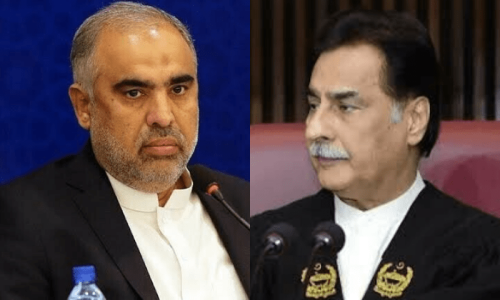KARACHI, Jan 13: Pakistan Muslim League-Nawaz Secretary-General Senator Zafar Iqbal Jhagra said on Tuesday that his party had decided to move an 18th amendment bill in the constitution to repeal its 17th amendment, as further wait for the ruling party to introduce such a bill in the parliament would harm democracy and the country.
He denied that attempts were being made to form an anti-government alliance, but said an “Alliance for the stability of democracy” could be formed to block the path of future adventurists by stabilising the democratic dispensation, though the idea was in its initial stage.
Mr Jhagra, who was accompanied by PML-N Sindh President Syed Ghous Ali Shah, Sardar Rahim, Zahid Rafiq Butt and Salim Zia, was speaking here at a press conference at the residence of Mr Shah.
Referring to the proposed amendment, he said the draft bill was being finalised in consultation with other political parties, including the ruling PPP, so that it could be adopted unanimously as the restoration of the 1973 Constitution to the position of Oct 12, 1999 was essential for stability and democracy in the country.
Expressing optimism about the unanimous adoption of the bill during the current session of the National Assembly, he said: “If we have to put the country on the right track, strengthening of other institutions with the supremacy of the state is the need of the hour.”
The PML-N leader termed the judiciary as the most important of the four pillars of the state, saying that that was why his party was striving to restore the judiciary to its pre-emergency position, which would regain its confidence on March 9, when not only the legal fraternity but all segments of society, including political parties, would take to the streets in its support.
He said the PML-N was committed to its stand on an independent judiciary and that was why the party chief, Nawaz Sharif, had decided to join the proposed long march on March 9 to take the movement to its logical end.
Mr Jhagra referred to the power cuts and brewing economic situation as matters of grave concern, but said the more serious issue was security of the country, as being a frontline state in the war against terrorism, and the way it was used had caused irreparable loss to its being.
However, he termed the unanimous adoption of a 14-point resolution by a joint session of parliament as a good message to the world that when it came to the security of the country, all parties stood united. He, however, deplored the delay in its implementation.
The resolution emphasised the adoption of an independent foreign policy and solving of issues related to the war on terror through dialogue by taking genuine stakeholders onboard to tackle non-state actors effectively.
In reply to a question, he said Nawaz Sharif was prepared to take not only the PML-Q but all parties along in order to steer the country out of the on-going crisis. However, the PML chief believed that those who had joined the former dictatorial regime to harm the democratic system of the country should be dealt with with a “principled yardstick”. But a final decision in this regard would be taken by the central working committee of the party, he added.
He denied there had been any formal negotiations between the leaderships of the two factions of the PML.
In reply to another question, he said democracy had already been restored in the country and after the election of the president, parliament had been completed.
Mr Jhagra said a new alliance called the “Alliance for the stability of democracy” could be formed to block the path of future adventurists for good. But, at the moment the move was at its initial stage, he added.
Syed Ghous Ali Shah, who is a former defence minister, ruled out the possibility of war between Pakistan and India, saying that Pakistan was no longer the country to be taken for a ride at will, as now it was a nuclear power like other states armed with nuclear weapons. “India very well knows that Pakistan can eliminate Delhi and Mumbai within minutes if war is imposed on it,” he said.
He condemned the Mumbai carnage, and also criticised the Indian leadership for blaming the tragedy on Pakistan. He said whatever happened in India, it pointed its finger immediately at Pakistan. On the other hand, for instance, when the Marriott Hotel tragedy happened in Islamabad, Pakistan did not blame India for it.
In reply to a question, he said Nawaz Sharif was not keen to take power, but was very interested in the continuation of the democratic order in the country as democracy was the panacea for the country’s present ills and crises.













































Dear visitor, the comments section is undergoing an overhaul and will return soon.